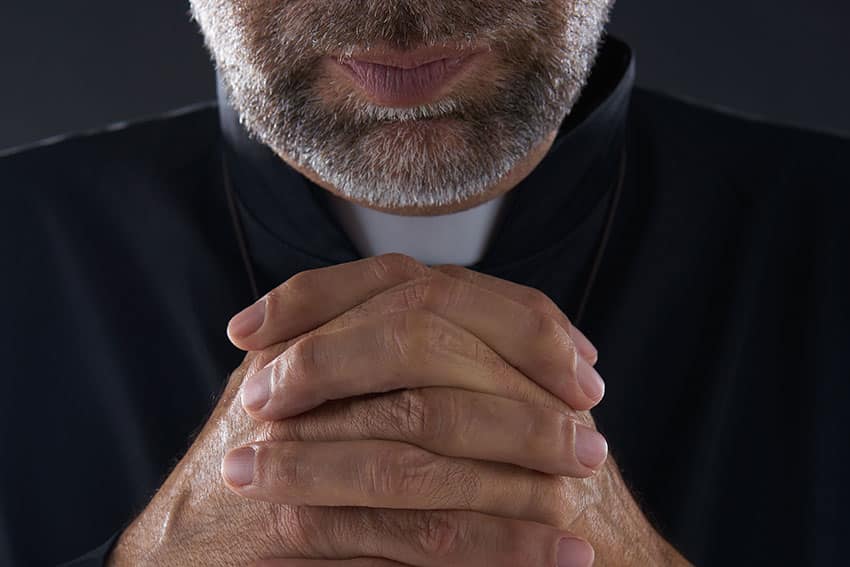
Imagine an Australian diocese in which Fr Youngtrad, a recently ordained priest, phones his bishop – and the bishop answers his own phone.
Fr Youngtrad wants to have a talk with his bishop in person. The bishop warmly welcomes him to his office on an afternoon that same week, and also invites him to concelebrate the 5.30pm Mass at the Cathedral with him after they meet.
In this diocese, there are no hidden agendas, no politics, and no loaded meanings in this invitation. Fr Youngtrad knows that he can trust his bishop completely, even though they may differ on their liturgical views. Fr Youngtrad is also very happy to concelebrate Mass with the bishop, because that’s quite normal in the diocese. It’s not reserved for cronies – or worse, priests in special kinds of trouble.
This is of course complete fantasy on my part. These dioceses mostly don’t exist, and mostly because they’re too big. In a large diocese, a bishop is very busy with administrative work. He needs a substantial staff of professional Catholics to help him. They all have mortgages and families, and so they aren’t going to rock the boat too much.
The bishop has another staff of senior clergy. These have been around for decades and are completely habituated to the problems in the diocese – so much so that they don’t even notice them any more.
A good bishop who knows all his priests will know if their doctrine is sound. He will know if they’re struggling with something they want to keep hidden. He will know if they’re celebrating the sacraments properly.
Neither group has much incentive to tell the bishop any bad news stories. The bishop may also not want to hear those bad news stories.
He may be happy just having his photo in the local Catholic paper every week cutting a birthday cake for a 100-year-old nun, or standing around with other church leaders with a serious face. If you’re a lay person who wants to get in the bishop’s ear about something, you quickly hit a phalanx of people who have made a career out of stopping this.
But it’s a hundred times worse if you’re a diocesan priest. In late 2021, a very interesting set of data was published which described young priests in the United States – their beliefs, attitudes, expectations, and relationships.
The Survey of American Catholic Priests included just over a thousand priests, and compared this group with a similar study in 2002. It found that in general, younger priests were more conservative than older priests. But it also described their low morale and poor relationships with their local bishops. These younger priests were less comfortable going to their bishop for help than the priests in the 2002 study.
It’s worth noting that more than half of the priests said that in a typical year they don’t have a personal visit with their bishop. Only a quarter said that they visited their bishop around once a year.
I’d bet that the situation in Australia is similar, with the same large dioceses, big bureaucracies, and demoralised younger clergy. Instead of a Church in which a bishop knows his priests as spiritual sons, these priests live in isolation and mistrust.
No wonder they’re demoralised. And no wonder they’re inclined to resent the monolith of bureaucracy that’s formed between them and their bishop. I’d also argue that the Church is not conspicuously safer or healthier today because bishops don’t know their own clergy.
Smaller dioceses would bring bishops closer to their priests. With a corrupt bishop, we know exactly where that leads: favouritism, financial crime, and usually sexual exploitation of young clergy as well. That’s exactly the way it is now.
But with a good bishop, a small diocese could be transformative for him, his people, and his clergy. And if there were more dioceses, there would be more places for clergy to transfer to if they were stuck with a bad bishop.
The Church is getting smaller and smaller in Australia, and our dioceses need to mirror that. Restoring the lost trust between diocesan priests and their bishops will take longer.
Genuine relationships between a priest and a bishop take time to develop and maintain. Yet they’re probably the most important thing in the diocese.
They’re way more important than the diocesan accounts, or the new cathedral car park, or even the 100-year-old nun’s birthday party.
A good bishop who knows all his priests will know if their doctrine is sound. He will know if they’re struggling with something they want to keep hidden. He will know if they’re celebrating the sacraments properly.
This is a future Church in Australia that would be well worth the effort.
Dr Philippa Martyr, a Perth-based academic, can be contacted at: [email protected]
